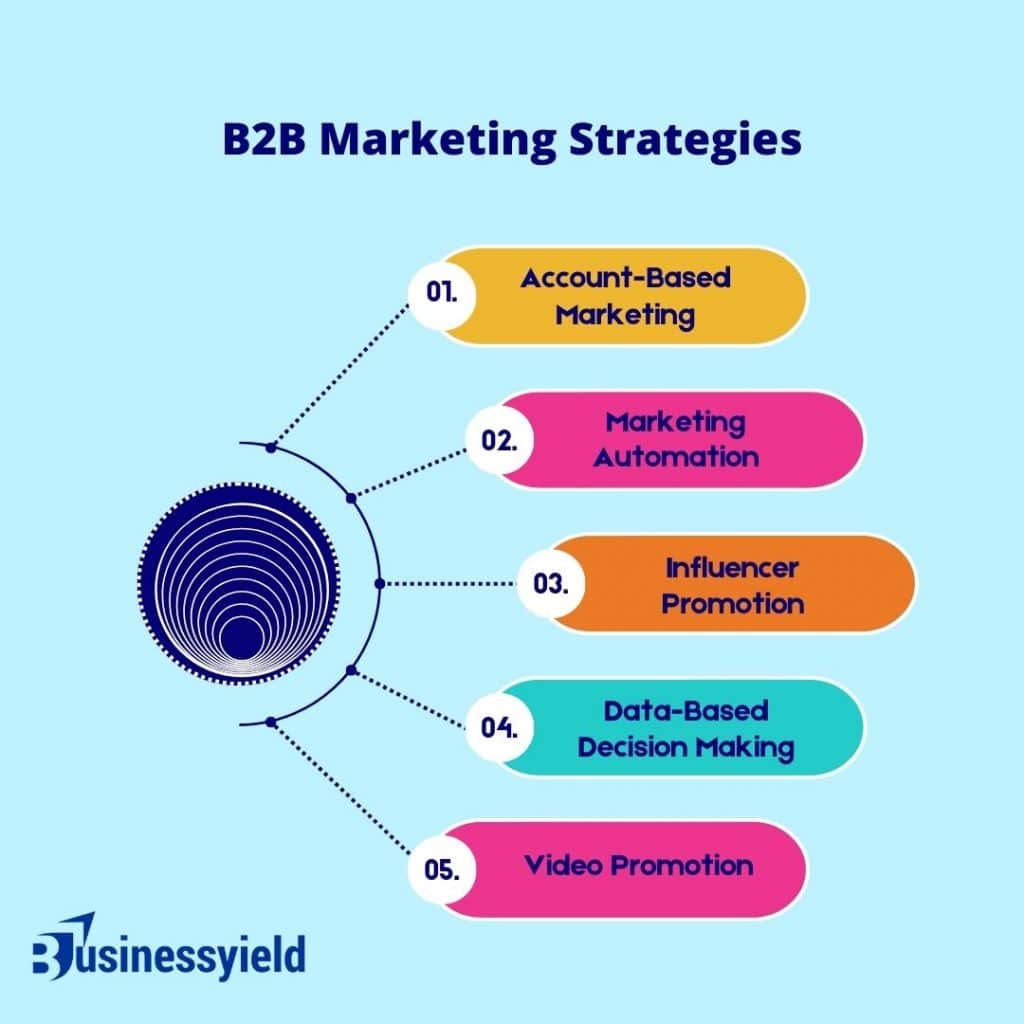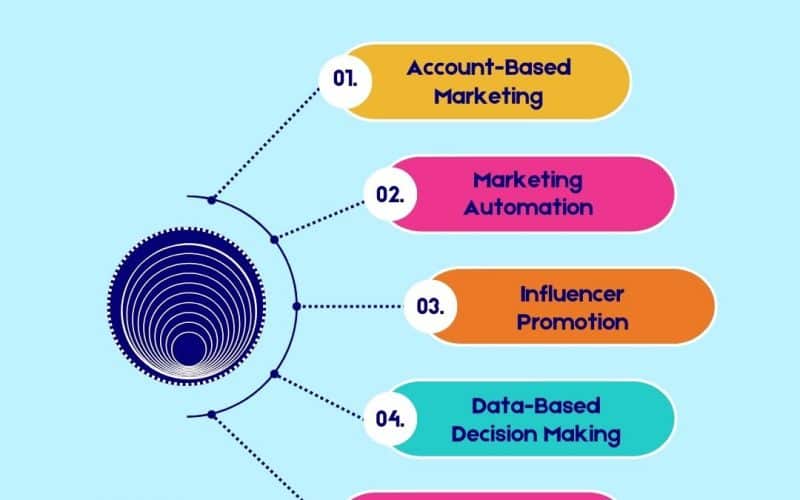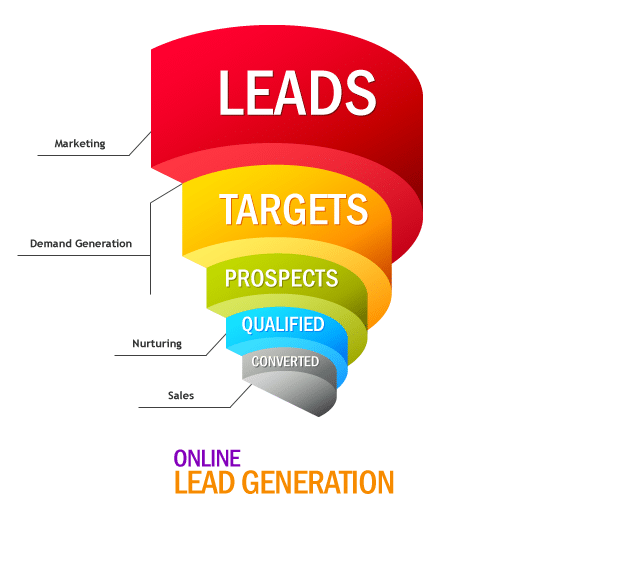Marketing is a dynamic and ever-changing landscape, and business-to-business (B2B) marketing presents a distinct set of difficulties and methods to consider. In this blog article, I will go into the realm of B2B marketing, dishing out the different types, best practices, and important trends for 2024, as well as B2B strategies necessary for better performance. Join me on this trip as I reveal the secrets to success in the B2B marketing sector, whether you’re a seasoned marketer or just starting out.
What is B2B Marketing?
B2B marketing, often known as business-to-business marketing, refers to the marketing activities and techniques used by companies that offer products or services to other companies rather than to individual consumers. The target clients in B2B marketing are often professionals, decision-makers, or buyers from other companies.
Key Takeaways
- Personalization is essential in B2B marketing because it allows you to form genuine connections with your target businesses.
- Thought leadership fosters trust and credibility, establishing you as a trustworthy business partner.
- Adopt data-driven decision-making to improve your B2B marketing efforts and take your company forward.
B2B marketing’s major purpose is to foster mutually beneficial partnerships between organizations, generate leads, and drive sales. B2B marketers concentrate on understanding their target audience’s demands, pain spots, and difficulties and building marketing strategies that successfully communicate the value and benefits of their products or services. Let’s take a look at the different types of B2B marketing in practice.
Types of B2B Marketing
Below are the different types of B2B marketing I will be giving you to gain a clearer insight.
#1. Content Marketing
Creating and disseminating valuable, insightful, and timely information in order to attract, engage, and educate the target audience. Blog entries, articles, whitepapers, case studies, films, webinars, and infographics are all examples.
#2. Email Promotion
Sending personalized and targeted emails to nurture leads, create relationships, offer updates, and market products or services. Email marketing is efficient for generating leads, nurturing leads, and retaining customers.
#3. SEO, Search Engine Optimization
Optimizing website content and structure to boost organic search ranks and search engine presence. Keyword research, on-page optimization, link development, and technical optimization are all part of SEO.
Using social media channels such as LinkedIn, Twitter, Facebook, and Instagram to communicate with the target audience, share content, raise brand awareness, and cultivate partnerships with other businesses.
#5. PPC (Pay-Per-Click) Marketing
Paid advertising campaigns on search engines (Google Ads) or social media platforms (LinkedIn Ads, Facebook Ads) are used to deliver targeted visitors to a website or specified landing pages. PPC ads can be extremely focused and provide demonstrable results.
#6. Account-Based Marketing
A tailored marketing strategy centered on identifying and engaging specific high-value accounts. ABM entails customizing marketing activities, content, and messaging to the specific demands and challenges of each account.
#7. Webinars and Online Conferences
Hosting virtual events, webinars, or online conferences to provide instructional information, exhibit thought leadership, and interact in real-time with the target audience. Webinars are useful for generating leads, nurturing prospects, and offering interactive experiences.
#8. Influencer Promotion
Working with business influencers, thought leaders, or experts to increase their authority and reach. Influential individuals help raise brand awareness, issue endorsements, and use their existing networks.
Diving into 2024, I’ll share not just trends but also how personalization has evolved beyond an option to an expectation. Drawing from my own journey, I’ll stress the pivotal role of thought leadership in establishing trust, along with the indispensable embrace of data-driven decision-making in the digital era.
How B2B Marketing Trends Can Transform Your B2B Marketing Strategies.
#1. Personalization is essential
Personalization is no longer an option in B2B marketing; it is an expectation. You can develop real connections that increase engagement and conversion by personalizing your messaging, content, and experiences for specific businesses. Accept personalization as a guiding principle in your B2B marketing initiatives.
#2. Thought Leadership Promotes Trust
In the business-to-business sector, trust is the money that drives partnerships. You may develop credibility and trust with potential clients by establishing yourself or your business as a thought leader in your industry. Through thought-provoking articles, webinars, and speaking engagements, you may share valuable insights, industry trends, and expertise.
#3. Accept Data-Driven Decision-Making
Data is king in the digital era. You can acquire useful insights into your B2B marketing activities by leveraging the power of analytics and tracking metrics. Make data-driven decisions that carry your business forward by optimizing your campaigns, identifying areas for improvement, and making data-driven judgments.
In my few years of expertise, I found out that recognizing the market trend can effectively boost your B2B marketing strategy, which can in turn transform your life. Let me show you some B2B strategies I used to kick-start your success.
Strategies for B2B Marketing in the Digital Age

Moving beyond theoretical concepts, I’ll reveal the B2B marketing strategies I’ve employed in the digital age. Some of the best strategies that I’ve used include:
#1. Account-Based Marketing
ABM is a personalized and targeted B2B marketing strategy that focuses on certain high-value accounts. Businesses may produce hyper-relevant content, provide personalized experiences, and establish stronger connections with key decision-makers by adapting marketing efforts to the needs and preferences of individual accounts.
#2. Marketing Automation
B2B marketers can use automation tools to streamline and scale their marketing efforts. Businesses may save time, enhance productivity, and provide a more personalized experience to their prospects and customers by automating repetitive operations such as email marketing, lead nurturing, and campaign tracking.
#3. Influencer Promotion
Industry influencers and thought leaders wield considerable power over the target audience in the B2B arena. Collaboration with influential people can help firms acquire credibility, broaden their reach, and tap into existing groups of interested professionals. Working with influencers to develop content, conduct webinars or podcasts, or attend industry events can increase brand visibility and generate quality leads.
#4. Data-Based Decision Making
The digital age provides access to a plethora of data, and B2B marketers must leverage this data. Businesses can make informed decisions, enhance marketing tactics, and create tailored experiences that resonate with their audience by monitoring user behavior, campaign performance, and customer insights.
#5. Video Promotion
In the digital age, video has surpassed all other forms of information consumption. B2B marketers can use video to showcase product demos, provide client testimonials, offer educational content, and tell engaging stories. Video content is extremely entertaining and can assist organizations in standing out in a crowded market.
Including Content Marketing In Your B2B Marketing Plan
Consider the following measures to properly include content marketing in your B2B marketing strategy:
#1. Define Your Objectives and Audience
Begin by carefully identifying your content marketing objectives. Do you want to raise brand awareness, generate leads, retain current consumers, or build thought leadership? Determine your target audience when you’ve established a clear goal. Understand their pain areas, difficulties, and interests, as these will influence the content you develop and the channels through which it is distributed.
#2. Create a Content Strategy
A well-defined content strategy is the foundation of effective content marketing. Begin by undertaking extensive study to find the themes and formats that are appealing to your target audience. Create a content schedule defining the types of material you’ll create, the frequency with which you’ll publish it, and the channels you’ll use to disseminate it.
You can check out the content strategy checklist below for your content marketing strategy.
#3. Produce High-Quality, Valuable Content
Concentrate on providing material that is useful to your target audience. Share insights, industry trends, best practices, and actionable advice that will assist people in overcoming obstacles or achieving their goals. Make certain that your content is well-researched, accurate, and unique. To captivate readers and make complex subjects approachable, use a conversational tone and storytelling approaches.
#4. Content Optimization for Search Engines
Optimize your content for search engines to increase its visibility and reach. Perform keyword research to uncover relevant keywords and naturally weave them into your text. Improve search engine rankings by optimizing meta tags, headers, and alt tags. Additionally, for a better user experience, make sure your website has a user-friendly structure, quick loading speeds, and mobile responsiveness.
#5. Use a variety of content distribution channels
Don’t confine your content to a single channel. Distribute it on other platforms to reach a larger audience. Create blog posts and distribute them on social media platforms like LinkedIn, Twitter, and Facebook. To appeal to varied content consumption tastes, repurpose your content into other media, such as films or infographics. Consider guest posting on industry-related websites to broaden your reach and reach new readers.
Benefits of B2B Marketing
- Higher Revenue Potential: Because B2B transactions frequently entail higher-value purchases, organizations can benefit from larger revenue streams. Selling to other companies offers larger profits and long-term contracts or collaborations.
- Relationship Building: B2B marketing places a premium on developing long-term connections with customers. These connections can lead to repeat business, referrals, and even strategic alliances, all of which can help a company’s growth and reputation.
- Customization and personalization: In B2B marketing, marketing messages, content, and solutions are frequently tailored to the specific demands and pain points of individual firms. This customization and personalization can boost customer satisfaction and increase the likelihood of a successful sale.
Drawbacks of B2B Marketing
- Longer Sales Cycles: B2B sales cycles are typically longer and more complex than B2C deals. This is because B2B purchases sometimes involve numerous decision-makers and necessitate rigorous study and analysis. Longer sales cycles may necessitate more time and resources to close deals.
- Limited Target Audience: B2B marketing has a limited target audience because it focuses on a certain sector or industry. While this has the advantage of allowing for more tailored content, it also implies that the possible consumer pool is smaller than in B2C marketing. As a result, the pool of possible clients is reduced, necessitating more targeted and specialized marketing activities.
Read Also: Target Audience: How to Find & Communicate With Them Effectively (+ Real Examples)
- Increased Competition: B2B marketplaces can be quite competitive, with numerous companies competing for the same consumers. It might be difficult to distinguish oneself from competitors and stand out in the market since it requires distinct value propositions, outstanding customer service, and strong relationships.
Examples of Beneficial Content Formats for B2B Marketing
- Content marketing relies heavily on well-written blog posts and articles. They enable you to research market trends, exchange ideas, provide educational content, and provide practical advice. Blogs can cover a variety of themes, such as industry news, thought leadership articles, how-to guides, case studies, and problem-solving content.
- In-depth white papers and eBooks are important resources for delving into specialized themes, addressing complicated challenges, and providing in-depth analysis. Whitepapers and eBooks are extremely effective at creating thought leadership and generating leads since they require readers to enter their contact information to access the content.
- Case studies highlight how your products or services have helped your consumers overcome real-world problems. They give concrete instances, demonstrate your competence, and emphasize the measurable benefits obtained.
Integrating Emerging Technologies in B2B Marketing
#1. Leveraging AI and Machine Learning
- Predictive Analytics: AI and machine learning are revolutionizing predictive analytics in B2B marketing. By analyzing historical data, AI algorithms can forecast future buying behaviors and market trends. For instance, a B2B tech company might use AI to predict which products will be in demand, allowing them to adjust their inventory and marketing strategies accordingly.
- Customer Segmentation and Personalization: AI enables highly precise customer segmentation based on a myriad of factors, including past purchases, online behavior, and engagement patterns. A case in point is a marketing automation platform that uses machine learning to personalize email campaigns, resulting in higher open rates and engagement.
#2. Utilizing Big Data for Informed Decision-Making
- Market Trends and Customer Preferences: Big data analytics provide invaluable insights into market trends and customer preferences, helping B2B marketers tailor their strategies effectively. For example, by analyzing large datasets, a B2B company can identify emerging industry trends and adjust its product development and marketing campaigns to stay ahead of competitors.
- Targeting and Segmentation: Big data analysis has transformed how B2B marketers approach targeting and segmentation. By processing vast amounts of data, businesses can identify precise customer segments and tailor their marketing efforts to these specific groups, enhancing the efficiency and effectiveness of their campaigns.
#3. Blockchain for Enhanced Security and Transparency
- Data Security and Trust-Building: Blockchain technology offers unmatched security and transparency in B2B transactions. Its application in marketing can enhance trust among businesses. For example, using blockchain to track and verify the authenticity of customer data can significantly improve credibility in data-driven marketing strategies.
- Transparency in Transactions: Blockchain can be used to create transparent and secure record-keeping systems. This is particularly beneficial in complex B2B transactions, where maintaining integrity and trust is crucial.
Innovative B2B Marketing Strategies
#1. Interactive Content for Engagement
Interactive content such as quizzes, surveys, and calculators can significantly enhance engagement in a B2B context. For instance, a software company might use an ROI calculator on its website to engage potential clients, allowing them to see the potential savings or revenue generation from using their product.
#2. Account-Based Marketing (ABM) with a Twist
Advanced ABM strategies focus on delivering highly personalized content to selected accounts. This could involve creating custom landing pages for major clients or using data analytics to deliver targeted content that addresses each client’s unique challenges and needs.
#3. Sustainable and Ethical Marketing Practices
Incorporating sustainable and ethical practices in B2B marketing can significantly enhance a brand’s image. For example, a company that prioritizes eco-friendly practices in its operations and marketing can appeal to a growing segment of environmentally conscious businesses.
The Future of B2B Marketing
#1. Predictive Analytics for Future Trends
Predictive analytics tools can analyze current market data to forecast future trends, giving B2B marketers a competitive edge. For example, using these tools, a B2B company can predict shifts in consumer preferences and adjust its product development accordingly.
#2. The Rise of Virtual Reality (VR) and Augmented Reality (AR)
VR and AR technologies have the potential to create immersive experiences for B2B clients, particularly in product demonstrations and virtual trade shows. For instance, a manufacturing company could use VR to give clients a virtual tour of their production facility or use AR to demonstrate how a complex piece of machinery operates in a real-world environment.
#3. Voice Search Optimization
With the rise of voice-activated devices, optimizing content for voice search is becoming increasingly important in B2B marketing. This involves using natural language and question-based keywords in content to improve visibility in voice search queries.
Building Stronger Customer Relationships
B2B companies can utilize platforms like LinkedIn to build online communities, fostering loyalty and advocacy. For instance, creating LinkedIn groups focused on industry-specific topics can help in engaging with peers and potential clients, thereby strengthening brand presence.
#2. Leveraging Customer Feedback
Actively seeking and incorporating customer feedback can significantly transform B2B marketing approaches. Regular surveys, feedback forms, and direct communication channels help in understanding client needs and expectations, leading to more effective marketing strategies.
#3. Nurturing Relationships Post-Sale
Maintaining relationships with B2B clients after the sale is crucial. This can include follow-up services, providing ongoing support, and keeping clients informed about new products and updates. Such strategies ensure long-term loyalty and repeat business.
Measuring Success in B2B Marketing
#1. Advanced Analytics Tools
Utilizing advanced tools and metrics helps in accurately measuring the success of B2B marketing campaigns. Tools like Google Analytics, CRM software, and specialized B2B analytics platforms provide detailed insights into campaign performance, audience behavior, and conversion rates.
#2. ROI-Focused Strategies
In B2B marketing, focusing on ROI (return on investment) is crucial. This involves developing strategies that directly contribute to revenue generation and business growth and differ from traditional marketing metrics that might focus more on reach and engagement.
#3. Continuous Learning and Adaptation
The B2B marketing landscape is constantly evolving. Marketers need to engage in continuous learning and adapt to new technologies, market trends, and customer behaviors. This agility enables B2B companies to stay relevant and competitive in a dynamic market environment.
What is the Importance of Business-to-Business Marketing?
B2B is vital since every business needs products and services from other businesses to start, run, and expand. A company’s B2B providers provide office space, office furniture, computer equipment, and software, and so on.
What is the Primary Goal of Business-to-Business Marketing?
Increasing brand, product, or service awareness among your target audience is one of the key purposes of B2B advertising. This can help you build trust, credibility, and reputation in your market while also attracting potential buyers to your website or landing page.
Conclusion
Implementing content marketing as part of your B2B marketing plan necessitates a deliberate and strategic approach. You can effectively engage your target audience, build brand authority, and drive meaningful business outcomes by defining goals, understanding your audience, creating valuable content, optimizing for search engines, leveraging multiple distribution channels, nurturing leads through email marketing, and measuring results. In 2024 and beyond, how will you use the potential of B2B marketing to establish deep and enduring connections with your target audience? How will you implement content marketing into your B2B marketing plan to engage with your target audience and meet your business goals?
- B2B SOFTWARE: The Best B2B Software in the Market to Drive Success in 2024
- Inbound Marketing: Effective Inbound Marketing Examples
- Design Thinking Process: Steps In The Design Thinking Process
- CONTENT MARKETING SERVICES: Best Services for Traffic, Rankings, & Sales






